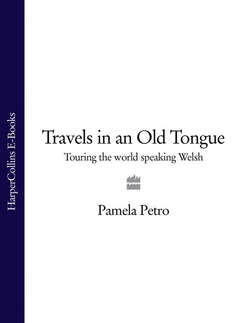Читать книгу Travels in an Old Tongue: Touring the World Speaking Welsh - Pamela Petro - Страница 36
Cymharu Nodiau to Compare Notes
ОглавлениеImmediately after the barbecue Ed and Rhiannon prepare to go to a friend’s fiftieth birthday party. It’s a Dutch custom, they tell us, to put a scarecrow in someone’s yard when the person turns fifty. Tonight their friend is compromising by dressing like one.
They give us a key, and Marguerite and I decide to take a walking tour of Delft.
‘So what do you know that I don’t know?’ I ask her, stepping over the brick mosaic of a fish set in the sidewalk outside a tropical fish store.
‘That I want to stay here and live with Rhiannon and Ed. Their friends are great, we can speak Portuguese …’
‘Forget it.’
‘Travelling around the world is tiring, you know?’ She sighs and gives in. ‘Rob and Phil are in the oil business, Rhiannon and Eryl are teachers. Geoff’s a translator. They all said they’d go back and live in Wales in a second, but they can’t because their jobs don’t exist there. Everyone but Geoff. He’s not Welsh.’
I sigh. I’d heard the same thing in Norway. There’s a limited apparatus in Wales to support people with specialized educations and high incomes.
Marguerite continues. ‘They all agree that living abroad is better than living in England. Here they can be in a safe, mid-size city, drive three hours and wind up in Brussels. In England they’d probably live near London, commute to work, and after a three-hour drive only get to Bristol.’
As she’s talking we come upon Market Square, a cobblestoned plaza the size of a football field where the bells of Nieuwe Kerk, or New Church – begun in 1383 – inexplicably begin to play ‘Frère Jacques.’ In my pocket I find a nest of grape seeds. Earlier, speaking to Rob and Eryl in Welsh, I’d been explaining our route around the globe when I’d recklessly eaten a grape. Had I been dealing in English I could’ve discreetly spat my seeds into a napkin, or on to my fork – jeez, I could’ve blown them into the air and caught them behind my back and still made my point. But because I was concentrating so hard on Welsh all I could manage was to put them in my pocket.
The grape seeds are emblematic of the afternoon. In six weeks I haven’t improved in Welsh so much as lost some of my fear of speaking (to all but Catrin); yet while I can understand what’s being said at the time, I can’t repeat later what we’ve talked about. It’s a strange and particular kind of amnesia. When I’d mentioned this to Rhiannon she’d got a wise look on her face.
‘I know what you mean. It goes in your ears, through your brain, but just can’t come out your mouth.’
Precisely. I explain to Marguerite that my Welsh brain knew all she’d just said, though I had no corresponding memory of it in English.
‘Isn’t that the language your book is supposed to be in?’ She sighs again.
Shops have begun to close and waiters are hunched down over outdoor blackboards, chalking in the evening’s menu. Tight, canalside parking places are filling up with expensive cars, and the brick façades of gable-fronted townhouses, which look to me like rows of ageing, uneven teeth, send the clop-scrape of high heels on cobblestone echoing back to the street. I like the townhouses’ immense windows – in these narrow enclaves they’re a necessity through which furniture must come and go by means of hoisting hooks that dangle from the upper gables. Tonight the window panes look like oblong ponds spawned from the dark canals below.
There is a cosy taste of wealth in the air, which neither Marguerite nor I can afford. We go back to the house for leftovers and dark yellow Dutch cheese, which Rhiannon told us comes from summer milk, when the cows graze on grass; in winter Dutch cheese is pale yellow, made from the milk of cows who eat hay.
